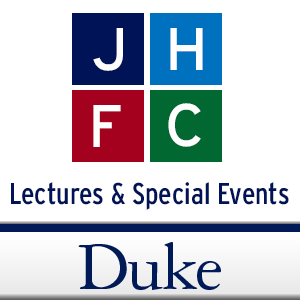Lectures & Special Events
Subscribed: 4Played: 46
Subscribe
Description
The John Hope Franklin Center for Interdisciplinary and International Studies is a unique consortium of programs committed to revitalizing notions of how knowledge is gained and exchanged.
Participants from a broad range of disciplines converge to explore intellectual issues, including some of the most pressing social and political themes of our time: race and race relations, the legacy of the African-American experience, equality and opportunity among diverse populations, the implications of accelerated globalization. At its core, the Center claims an intrepid and daring mission: to bring together humanists and those involved in the social sciences in a setting that inspires vigorous scholarship and imaginative alliances. In this way, historians, artists, literary scholars, and philosophers contribute to a rich understanding of moral and ethical issues.
Inspired by the example of John Hope Franklin--Duke professor emeritus, historian, intellectual leader, and lifelong civil rights activist--the Franklin Center embraces a creative cross-pollination of ideas, perspectives, and methodologies. Using such sophisticated resources as multimedia and high-speed videoconferencing, the Franklin Center employes advanced technologies not only as a means to an end, but as objects of critical inquiry themselves. These striking new directions in higher education require the marriage of philosophical imagination and pragmatic design.
The Franklin Center currently houses:
Asian and Middle Eastern Studies
Association of International Education Administrators
Canadian Studies Center
Center for European Studies
Center for Global Studies and the Humanities
Center for International Studies
Center for Latin American and Caribbean Studies
Concilium on Southern Africa
Duke Islamic Studies Center
Duke University Fulbright
Duke University Middle East Studies Center
Franklin Center Distinguished Faculty
International Comparative Studies
North Carolina Consortium for South Asian Studies
Policy and Organizational Management Program
University Scholars Program
Participants from a broad range of disciplines converge to explore intellectual issues, including some of the most pressing social and political themes of our time: race and race relations, the legacy of the African-American experience, equality and opportunity among diverse populations, the implications of accelerated globalization. At its core, the Center claims an intrepid and daring mission: to bring together humanists and those involved in the social sciences in a setting that inspires vigorous scholarship and imaginative alliances. In this way, historians, artists, literary scholars, and philosophers contribute to a rich understanding of moral and ethical issues.
Inspired by the example of John Hope Franklin--Duke professor emeritus, historian, intellectual leader, and lifelong civil rights activist--the Franklin Center embraces a creative cross-pollination of ideas, perspectives, and methodologies. Using such sophisticated resources as multimedia and high-speed videoconferencing, the Franklin Center employes advanced technologies not only as a means to an end, but as objects of critical inquiry themselves. These striking new directions in higher education require the marriage of philosophical imagination and pragmatic design.
The Franklin Center currently houses:
Asian and Middle Eastern Studies
Association of International Education Administrators
Canadian Studies Center
Center for European Studies
Center for Global Studies and the Humanities
Center for International Studies
Center for Latin American and Caribbean Studies
Concilium on Southern Africa
Duke Islamic Studies Center
Duke University Fulbright
Duke University Middle East Studies Center
Franklin Center Distinguished Faculty
International Comparative Studies
North Carolina Consortium for South Asian Studies
Policy and Organizational Management Program
University Scholars Program
69 Episodes
Reverse












